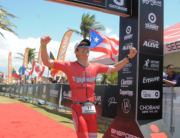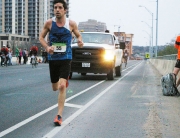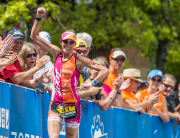 It’s inevitable as the season draws to a close for most cyclist and triathletes we immediately start looking toward next year and how we’ll do things differently to get better results and reach new levels of personal performance. As coaches we also start reviewing the efficacy of the current season’s training, identifying areas of success and areas in which we feel the athlete could gain that extra advantage next season.
It’s inevitable as the season draws to a close for most cyclist and triathletes we immediately start looking toward next year and how we’ll do things differently to get better results and reach new levels of personal performance. As coaches we also start reviewing the efficacy of the current season’s training, identifying areas of success and areas in which we feel the athlete could gain that extra advantage next season.
A lot of athletes start asking about gear for the next season. Spurred on by the excitement of new equipment, this bike or that, a new set of wheels or maybe, finally, a power meter (since if you’re a DT athlete there’s no better group to train you with power), racing flats, GPS units, there are always new purchases to be made and budgeting for those is important but is that the best budgeting you can do?
As you start to think about next season, think about the most important budgeting you can do and that’s the budgeting of your recovery, most importantly your sleep. It’s a busy world we live in, family, jobs, social commitments and of course our driven self nature that pushes us to be the best we can be as athletes. A lot of time these priorities start to collide and something has to give, my advice to you practice budgeting for your sleep and recovery, it’ll help. Here is the why and how.
Sleep deprivation has long been of interest in military and occupational settings. The understanding of how sleep loss will affect operations for shift workers and sleep deprived soldiers has significant ramifications for safety and efficacy. For athletes, much of this research has trickle down significance for our performances. Despite what might be thought of as conventional wisdom a majority of the literature does not support sleep loss and negative changes to broad physiological parameters. Metabolic cost (VO2, VCo2), muscle strength, electromehcanical responses, exercise heart rate and body temperature in subjects that exercised in sleep deprived states vs. well rested control groups were no different. These results have been reproduced time and again, however in contrast to no change in physiological components; psychological factors seem to be significantly influenced by disrupted sleep. Several studies have shown that time to exhaustion is significantly decreased when a subject is in a sleep deprived state. In one study subjects walking at 80% of VO2 max reached exhaustion an average of 11% sooner than non sleep deprived subjects (despite a doubling in monetary incentive to keep going!). If we might be so bold as to apply that to our respective sports that would mean the athlete time trialing at 275w for 40km is now down to 245w or the runner holding 6:30/mi can now only hold 7:12 pace. Think about all of the hard work and training time we put in, only to have our performance substantially undermined by poor sleep patterns.
Now with respect to good science, it must be noted that these subjects were deprived of sleep for 36hrs, that’s quite a bit more than losing a few hours here and there, but never doubt the compounding effects of life and training stress, this causes a cascade of stress hormones to be released, in small doses these are good, in chronically elevated amounts it can be a catastrophe. In fact several studies found that sleep deprivation caused a decrease in glucose tolerance and insulin resistance. This means that fuel does not reach the cell and performance suffers, so a potential for the inability to maintain an effort may be due to a more rapid rate of glycogen depletion as there would be a greater reliance on stored carbohydrates.
These same studies also confirmed that ratings of perceived exertion were much higher in sleep deprived subjects and a significant deterioration in mood state was observed. My interpretation of this suggests that a combination of substrate utilization and mood state causes athletes to slow down sooner. The literature seems to have more support for there being a much bigger psychological component than physiological component slowing us down.
As a coach some of this actually comes as somewhat good news. If life’s just gotten a little crazy and the athlete is short on sleep, there’s been travel across time zones or the athlete is in a 24hr/adventure race, I can confidently say that, physiologically they can perform but that they need to really be prepared to go deep into the pain cave and go there early, because the head is going to be telling you to stop long before you might really have to. So, we can prepare for that and discuss strategies ahead of time.
So, what can you do to make sure disrupted sleep is not undermining your performance? Budget. Budget your day and make sure sleep is a priority. We’re good about allocating time in our busy days for our workouts; I would encourage you to do the same for your sleep. If you know that you have a 1.5-2.5hr window in the day to get your training done (this includes, suiting up, workout, shower and a bite to eat) you can budget for that and adjust your daily schedule as necessary. The same is true for sleep, at minimum 7-8hrs of sleep most night of the week needs to be your goal if you are expecting optimal performance and if you can pull it off, get in a little more. This is especially true during heavy training blocks and peak times of the racing calendar. So, if training takes up 2hrs of your day and you need to sleep 8hrs during the day, you now have 10hrs of your day that cannot be budgeted for anything else, with that it might mean bumping back a morning meeting, skipping out early at a dinner or making the executive decision to dial back your workout for the day so that you can catch up on some sleep.
In the long run, good consistent sleep patterns will allow you to get the most out of your training and that means you’ll be optimally prepared on race day when it really matters. So remember sometimes the best thing you can do for your performance is the easiest, sleep!
Questions? Shoot Derick a note.
References:




Leave A Comment